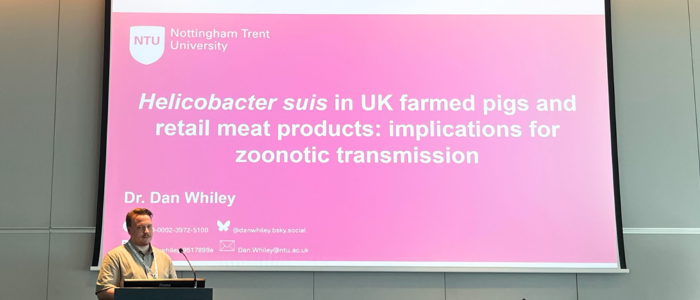
Dan Whiley, a Postdoctoral Research Fellow at Nottingham Trent University (NTU), was recently awarded the Don Whitley Scientific (DWS) Travel Grant to attend the Microbiology Society Annual Conference in Liverpool, where he gave an oral presentation entitled “Helicobacter suis in UK farmed pigs and retail meat products: implications for zoonotic transmission.”
We asked Dan to share more about his work and experience at the Microbiology Society Annual Conference:
“My research focuses on the understudied zoonotic pathogen Helicobacter suis, a bacterium that primarily infects pigs. It is thought to cause disease similar to the human-adapted Helicobacter pylori, including gastritis and gastric ulceration. However, this is not well studied, and zoonotic transmission of H. suis between pigs and humans remains poorly understood, particularly in the UK.
To better understand H. suis infection in UK-based farmed pigs, we collected stomach biopsies from pig stomachs donated by an abattoir. These were used to isolate viable H. suis and for histological analysis. In parallel, we sampled raw pork products intended for human consumption to investigate whether contaminated food could be a source of zoonotic transmission.
As H. suis is a microaerophilic bacterium, we attempted culturing in a Whitley A35 Anaerobic Workstation using a gas mix of 10% carbon dioxide, 5% oxygen, and 85% nitrogen for a minimum of five days. We then performed DNA extraction and a Helicobacter-specific PCR to confirm isolation.
Our study identified viable H. suis in 4 out of 95 (4.2%) meat samples and from 6 out of 7 (85.7%) pig stomachs. From one pig, we isolated H. suis from multiple regions of the stomach, suggesting pan-infection. Histology revealed that all infected pigs showed one or more markers of disease, similar to those observed in H. pylori infection in humans, as assessed using the updated Sydney scoring system. These markers included bacterial load, inflammation, atrophy, intestinal metaplasia, and eosinophil infiltration.
These findings suggest that H. suis contamination is present in UK raw pork products and indicate a high prevalence of the infection in UK-based farmed pigs. Disease markers in pig stomachs linked to H. suis infection raises significant animal welfare concerns.
I am incredibly grateful to DWS for awarding me with the travel grant, which allowed me to present and disseminate this research at the Microbiology Society conference “Exploring Hidden Threats: Knowledge Expansion of Understudied Bacterial Pathogens” session.
I would also like to thank the BBSRC Magnify Scheme and NTU School of Science and Technology (SST) SMART Postdoctoral Research Fellowship programme for funding this research project. It was further supported by the AROM group, especially my line managers Dr Meehan and Dr McLean for freeing up my time to work on this project, and Emily Chen for driving most of the lab work as Summer Research Student funded through the BBSRC Magnify Scheme. I also thank the Microbiology Society for part-funding my conference attendance.
Finally, it was especially meaningful to learn that DWS is based in the same town where I grew up, a connection I only discovered during a technical lab visit, thanks to Stuart Moore. It is inspiring to see DWS supporting researchers and enabling us to share our work with the wider scientific community.”

We thank Dan for this fantastic insight and once again congratulate him on his success. If you have a Whitley Workstation and want to know whether you’re eligible for the DWS Travel Grant, please head to our Workstation Travel Grant page. Discover more stories like Dan’s through the blog items below.


 CH
CH


 English
English